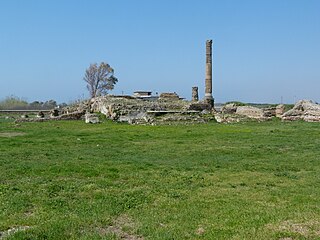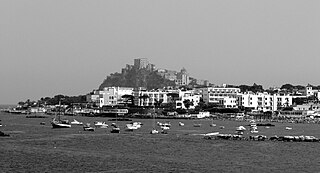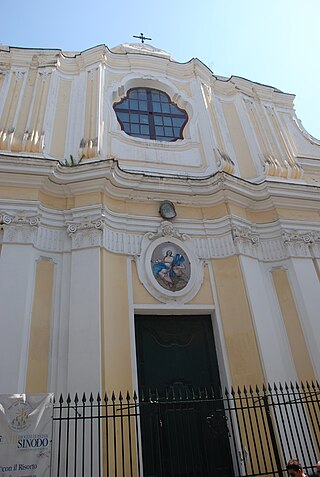
The Tyrrhenian Sea is part of the Mediterranean Sea off the western coast of Italy. It is named for the Tyrrhenian people identified with the Etruscans of Italy.
According to the Roman poets Virgil and Ovid, the Sirenum Scopuli were three small rocky islands where the sirens of Greek mythology lived and lured sailors to their deaths. "The Sirenum Scopuli are sharp rocks that stand about a stone's throw from the south side of the island" of Capri, was Joseph Addison's confident identification.

Capri is an island located in the Tyrrhenian Sea off the Sorrento Peninsula, on the south side of the Gulf of Naples in the Campania region of Italy. The main town of Capri that is located on the island shares the name. It has been a resort since the time of the Roman Republic.

Ischia is a volcanic island in the Tyrrhenian Sea. It lies at the northern end of the Gulf of Naples, about 30 km (19 mi) from Naples. It is the largest of the Phlegrean Islands. Roughly trapezoidal in shape, it measures approximately 10 km (6 mi) east to west and 7 km (4 mi) north to south and has about 34 km (21 mi) of coastline and a surface area of 46.3 km2 (17.9 sq mi). It is almost entirely mountainous; the highest peak is Mount Epomeo, at 788 m (2,585 ft). The island is very densely populated, with 62,000 residents.

Liternum was an ancient town of Campania, southern central Italy, near "Patria lake", on the low sandy coast between Cumae and the mouth of the Volturnus. It was probably once dependent on Cumae. In 194 BC it became a Roman colony. Although Livy records that the town was unsuccessful, excavation reveals a Roman town existed there until the 4th century AD.

The Gulf of Naples, also called the Bay of Naples, is a roughly 15-kilometer-wide (9.3 mi) gulf located along the south-western coast of Italy. It opens to the west into the Mediterranean Sea. It is bordered on the north by the cities of Naples and Pozzuoli, on the east by Mount Vesuvius, and on the south by the Sorrento Peninsula and the main town of the peninsula, Sorrento. The Peninsula separates the Gulf of Naples from the Gulf of Salerno, which includes the Amalfi Coast.

The Province of Naples was a province in the Campania region of southern Italy.
The island of Capri is situated in the Gulf of Naples, between the Italian Peninsula and the islands of Procida and Ischia. Made of limestone, its lowest part is at the center, while its sides are high and mostly surrounded by steep precipices, which contain numerous caves. Its topography is dominated by the slopes of the Monte Solaro in the West and Monte San Michele the East.

The Phlegraean Islands are an archipelago in the Gulf of Naples and the Campania region of southern Italy.

Vivara is a satellite islet of Procida, one of the three main islands in the Gulf of Naples.

Ischia is a town and comune on Ischia island in the Tyrrhenian Sea.
The Campanian Archipelago, also called Neapolitan Archipelago, is an archipelago in the Tyrrhenian Sea, in southwestern Italy. It principally comprises 5 islands: Capri, Ischia, Nisida, Procida, and Vivara. Most of the archipelago belongs to the Metropolitan City of Naples.

Saint Restituta is a Berber saint and martyr of the Roman Catholic and Eastern Orthodox Churches. She was said to have been born in Carthage or Teniza and martyred under Roman Emperor Diocletian. The location and date of her martyrdom are not precisely known. She sometimes is considered one of the Martyrs of Abitinae, Roman Province of Africa, a group of North Africans including St. Dativus, St. Saturninus, et alia, who were martyred in AD 304.

Caremar is an Italian shipping company, a subdivision of state-owned Tirrenia di Navigazione until 2009, when it was transferred to the Campania regional government and later in 2012 to the Mediterranean Shipping Company. It operates in routes from Campania to Capri, Ischia, Procida.

The Diocese of Ischia is a Roman Catholic ecclesiastical territory in Campania, southern Italy. It is a suffragan of the Archdiocese of Naples. The diocese comprises the entire island of Ischia, which contains seven communes divided into two circumscriptions. In 1743, the population was about 4,000. The city of Ischia constituted one single parish, with two religious houses of men and one of women. In 2018, the population of the town of Ischia was 20,118.

Giuliano De Risi is an Italian journalist.

Marina Grande is the main port of the island of Capri in Italy, to the north of the main town of Capri and at the foot of Mount Solaro.
Santa Maria del Soccorso is a church located within the archaeological site of Villa Jovis, on the island of Capri, Italy. It is situated on the summit of the Lo Capo hill at the eastern extremity of the island. The chapel-like church, was constructed ca. 1610. Its fittings include a bronze statue of the Madonna, a 1979 gift of the Caprese painter Guido Odierna (1913-1991). In the late 19th century, hermit lived at the church, keeping a visitor's book and selling wine.
The Roman Catholic Diocese of Capri was a Roman Catholic diocese located in the city of Capri on the island of Capri, in the Tyrrhenian Sea off the Sorrentine Peninsula, on the south side of the Gulf of Naples in the Campania region of Italy. On 27 June 1818, it was suppressed to the Archdiocese of Sorrento.

Jacques Etienne Chevalley de Rivaz was a Swiss-born physician who spent his career in Naples and the Island of Ischia. He was the founder of a famous sanatorium on Ischia and also wrote several works on the geography, archeology, flora and fauna of the island. For his services to Naples during the cholera epidemic of 1836–37, he was awarded a gold medal by King Ferdinand II and citizenship of the Kingdom of the Two Sicilies. Chevalley de Rivaz was born in Vevey, Switzerland and died in Casamicciola, Italy at the age of 62.















